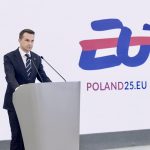Poland to focus on security, regional cooperation during upcoming EU rotating presidency
Reading Time: 2 minutesPolish government representatives outlined the key priorities for its six-month stint holding the presidency of the Council of the EU from 1 January , at a press event at the Chancellery of the Prime Minister in Warsaw on Tuesday, 10 December.
Unveiling the motto of its upcoming tenure “Security, Europe!”, Polish officials said they will prioritise security concerns in light of geopolitics, not least Russia’s invasion of Ukraine.
The presidency of the Council rotates among the 27 EU member states every 6 months, and chairs meetings at every level in the Council, helping to ensure the continuity of the EU’s work in the Council. Poland takes the reins from Hungary, which has hosted one of the most singular tenures ever.
Security Europe!
Poland assumes the EU presidency at a time of rising geopolitical tensions and growing threats to the security of the continent. Polish EU Minister Adam Szlapka said the war in Ukraine and its consequences, including increased security risks and the erosion of the international rules-based order, will dominate the agenda of the Polish EU presidency.
The presidency will focus on enhancing European security including external, internal, economic, information, energy, food, and health. The Polish government said it is committed to strengthening the EU’s defence capabilities and bolstering its ability to withstand hybrid attacks targeting democracy and critical infrastructure. The emphasis on security comes amid rising concerns over terrorism, cyberattacks, and migration flows, which have placed European unity and stability under strain.
Poland to promote civil society communication
Poland’s presidency will also prioritise public engagement via cross-sectoral events focusing on security and dialogue in business, academia, and civil society. These events will be held nationwide and will bring together key stakeholders from across Europe, offering platforms for pluralistic discussions on critical issues.
Over Poland’s 6-month stint, more than 40,000 participants are expected to attend events, including heads of state and ministers from EU member countries. Poland will host 22 informal Council meetings and approximately 300 accompanying events, ranging from expert panels to official negotiations.
The Polish government has allocated a budget of PLN 415mn (EUR 97.4mn) to manage the presidency. The focus will be on efficiency and transparency as Poland works to steer the EU through a critical period of its history.
As the presiding member state, Poland will oversee the Council’s legislative activities, manage relations with the European Parliament and the European Commission (EC), and represent the EU in external relations with third countries and international organizations. Poland’s role will also include facilitating EU decision-making and ensuring smooth cooperation between EU institutions, including the European External Action Service.
In addition, Poland will coordinate discussions on the EU’s foreign and security policies, ensuring alignment with the EC’s proposals and the European External Action Service. The Polish presidency will also play a pivotal role in keeping the EU’s actions consistent, transparent, and responsive to the challenges at hand.
Presidential logo carries historic weight
Poland also unveiled a logo for its presidency. Created by Jerzy Janiszewski, the same artist responsible for the trade union Solidarity movement’s logo in 1980, the emblem integrates Poland’s flag with the letters “EU,” representing the commitment of its current government, led by Europhile and Polish Prime Minister Donald Tusk, to European integration.
The government said the presidential logo is a nod to Poland’s historical journey from the Solidarity movement in the 1980s to its current role as an increasingly key EU player. It signifies Poland’s ambition to lead Europe towards new policy directions, particularly in addressing security and regional cooperation.

